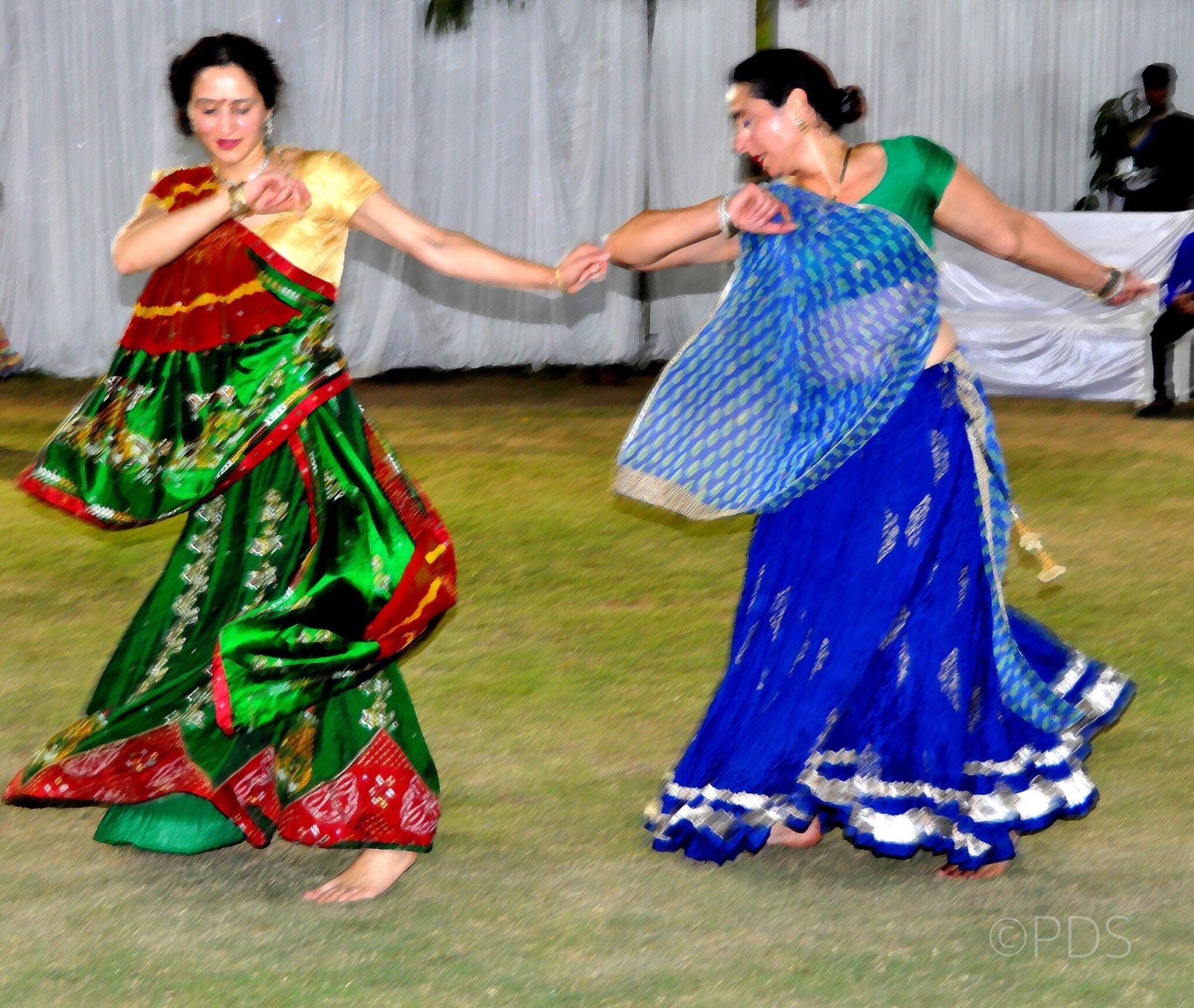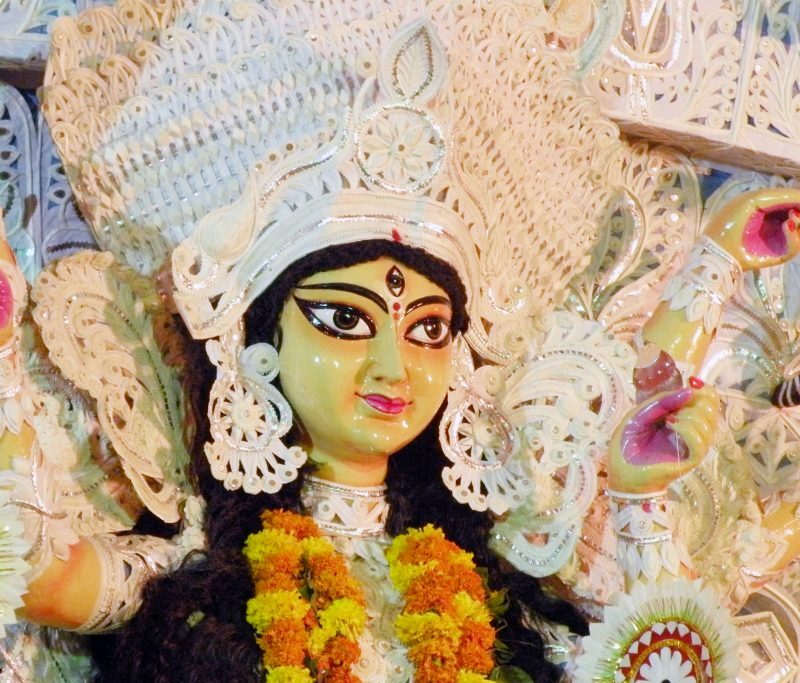
Outside of India, Diwali is arguably the best known Hindu festival. It’s earned colorful and bright celebrations at city halls, governor’s mansions, and the White House. It’s the topic of lofty resolutions and proclamations at every level of government. There’s even a colorful US postage stamp, earned after years of advocacy by the Hindu and Indian American communities.
But it’s not my favorite festival — if I may indulge in showing a preference in the realm of the sacred.
Rhythmic quick steps of hundreds of feet accompanied by the synchronized sway of arms, earthy drum beats and soulful praises to the Goddess guiding dancers’ graceful, yet energetic movements in concentric circles, whirling, embellished, colorful skirts and the sound of clinking silver and gold bangles and belled anklets, and sweat drying off in a crisp fall night’s air are the marks of my favorite festival — the autumnal Navarātri or the nine night celebration of the Feminine Divine.
There are four Navarātri throughout the year, but the one during the Hindu month of Ashwin is the most celebrated throughout India and the Hindu diaspora. In some regions and traditions, each of the nine nights honor the nine avatār or forms of the Mother Goddess, Goddess Durga. Others celebrate the nine days in three sets of three — the first three nights honoring Durgā (Goddess of Creation and Transformation), the second three nights honoring Lakshmi (Goddess of Prosperity and Wellbeing), and the last three honoring Saraswati (Goddess of Knowledge and Learning). Navaratri is topped off with the 10th day celebration of Dussherā or Vijayādashami — commemorating the victory of Goddess Durgā over the demon, Mahishāsura, or the victory of Lord Rama over the demon-king Ravana. Regardless of which legend one commemorates, the fierce goodness of Shakti stamping out negativity is both the cause and prayed for effect of the invocations of all devotees.
Throughout the world, the nine day festival is filled with fasting and sacrifices, meditation and reflection, rituals and bonfires, elaborate displays of dolls and processions, or music and dance. For those of us with roots in the Indian state of Gujarat, celebration of Navaratri is marked with nine nights of the participatory religious folk dance form of garbā (and rās) — even here in the United States. The origins of garba are ancient. According to lay scholar Bipin Thanky, many believe the 11th century Mahārāni Minaldevi, when she married the Gujarati king, Mahārājā Karna I, brought with her a traditional folk dance from Karnātaka which evolved into garba in her new home.
The word garba originates from the Sanskrit word garbhadeep — garbha meaning womb and deep meaning clay lamp. Traditionally, beautiful displays of ornately decorated murti and images of Goddesses and lit lamps anchor the center of any space in which garba is played. Garba honors the Feminine Divine in all Her manifestations, celebrates fertility and samsāra (the cycle of birth, life, death, and rebirth). Some also have interpreted the circle of dancers as symbolic of the body and the center religious display as the Divinity that resides within every physical body, as well as the always changing material world which has at its core the eternal, unchanging Divine or Consciousness. Garba used to be the domain of women only (garbi was for men as was raas), but over time, women and men participate together in both garbā and rās.
Garba is played during other auspicious occasions, but it’s manifestation during Navarātri world over is a sight to be seen and an experience to behold. Traditional garba songs invoke the legends of the Goddess, but may also touch upon the loving relationship of Lord Krishna and his devotee-consort, Rādhā (especially when the stick folk dance of rās is played). They may cover the daily travails of rural, village life, such as the grind of daily chores, a wife requesting gifts of her husband on his travels to faraway villages, or playful complaints about in-laws. The instruments include the traditional shehnāi; percussives like dhol, dholak, and tabla; the Indian flute, harmonium, and manjira (cymbals). More modern renditions utilize synthesizers and Western drums.
Styles also vary between different regions of Gujarat, as can the combinations of steps. There simple clap-and-snap routines (be tāli and trana tāli), and more involved permutations that incorporate moving forward and backwards, and combinations of half and full circles (heench, dhodhiu, etc.). Fashions also change from year to year, but the foundational outfit for women is called chanyā choli, which consists traditionally of a cotton full-flare long skirt, midriff fitted blouse, and a long rectangular drape or odhni. These sets are intricately embellished with embroidery, mirror-work, shells, and other work. Men may wear loose or fitted drawstring cotton pyjama (pants) with long kurta (tunic-like shirts) or dhoti khedhiyu which are specially pleated bottoms with a decorated skirted top.
A key element of any Navarātri garba celebration is the ārati. An ārati is a devotional which sings praises to the God or Goddess being venerated, and ritually honors the murti or religious display with the circular waving of lit lamps. The most common Navarātri ārati is entitled Jaya Ādhyā Shakti, the singing of which ends with the chanting of three shlokā or sacred Hindu couplets to the Goddess. The meaning of this particular ārati is a perfect synopsis of the central role the Feminine Divine plays throughout Hindu life and at every level — from the daily, ritual to the philosophical and metaphysical.
When sung as a community of devotees in between the rapture of dancing together for the Goddess, ārati provides an uplifting experience like no other for me.
Ambemā ni Ārati*
Om Jaya Ādhyā Shakti
Mā Jaya Ādhyā Shakti
Akhandda Bhramāndda Nipāvyā
Paddave Pragattyā Mā
Om Jayo Jayo Mā Jagadambe
Om Embodiment of Empowerment
Great Mother of the Cosmos
You beautified the cosmos, creating the galaxies, planets, stars, and the seven planes of heavens and of the netherworld
On the first eve of the month of Ashwin
Om Glory Om Glory, Mother of the Cosmos
Dvitiyā Be Swarup
Shiva Shakti Jānu Mā Shiva Shakti Jānu
Brahmā Ganapaṭi Gāye
Hara Gāye Hara Mā
Om Jayo Jayo Mā Jagadambe
We venerate You in two forms
You are Shiva, You are Shakti, I know.
Lord Brahma and Lord Ganesh sing Your praises
All sing Your praises, Mother of All
Om Glory and Victory to the Mother of the Cosmos, Mother of the Universe
Ṭriṭiyā Ṭrana Swarup
Ṭribhuvana Mā Betthā Mā Ṭribhuvana Mā Betthā
Ṭrayāthhaki Ṭaraveni
Ṭu Ṭaraveni Mā
Om Jayo Jayo Mā Jagadambe
On the third eve, we venerate Your three forms
Goddess Mahakali, Goddess Mahalakshmi, and Goddess Saraswati
Mother, who residing and ruling the three worlds (heavens, earth, netherworld)
These worlds are the fruits of Your power and protection
You Are the Giver of Liberation
Om Glory and Victory to the Mother of the Cosmos, Mother of the Universe
Chothe Chaṭurā Māhalakshmi Mā
Sacharāchara Vyāpyā Mā Sacharāchara Vyāpyā
Chār Bhujā Chau Dishā
Pragattyā Dakshinamā
Om Jayo Jayo Mā Jagadambe
On the fourth eve, we venerate You in the form of Mahalakshmi pervading the Cosmos with prosperity and wellbeing
As the beautiful four-armed Goddess with a mace, sword, shield, and lotus
You created Deva (divine beings) in the South for the wellbeing of all life
Om Glory and Victory to the Mother of the Cosmos, Mother of the Universe
Panchami Pancha Rushi
Panchami Guna Padma Mā Panchami Guna Padma
Pancha Ṭaṭva Ṭyā Sohiye
Panche Ṭaṭvo Mā
Om Jayo Jayo Mā Jagadambe
The five great sages praise You,
You who sit upon the Lotus
Through Your grace, the sages learned about the five basic elements (air, earth, water, fire, ether) essential to the cycle of cycle
You, the Creator of the five elements
Om Glory and Victory to the Mother of the Cosmos, Mother of the Universe
Shasti Ṭu Nārāyani
Mahishāsura Māryo Mā Mahishāsura Māryo
Nara Nāri Nā Rupe
Vyāpyā Sarve Mā
Om Jayo Jayo Mā Jagadambe
On the 6th eve, we venerate You in the form Nārāyani,
The Slayer of the demon Mahishāsura
You are the slayer of Mahishāsura who represents our negative thoughts and actions
You have manifested in and as every man and woman
You are immanent and transcendent
Om Glory and Victory to the Mother of the Cosmos, Mother of the Universe
Sapṭame Sapṭa Pāṭāl
Sandhyā Sāviṭri Mā Sandhyā Sāvitri.
Gau Gangā Gāyaṭri
Gauri Giṭā Mā
Om Jayo Jayo Mā Jagadambe
On the 7th eve, we venerate You who forced all negativity to descend into the seven netherworlds
You manifest as prayer and as Savitri, the consort of Brahma
You manifest as the ever-giving and compassionate cow, the cleansing waters of the Ganga, the Gayatri mantra, Goddess Parvati, and as the knowledge of the Gita to purify our hearts and minds for self-realization
Om Glory and Victory to the Mother of the Cosmos, Mother of the Universe
Ashttami Ashtta Bhujā
Āi Ānandā Mā Āi Ānandā
Sunivara Munivara Janamya
Deve Deityo Mā
Om Jayo Jayo Mā Jagadambe
As the beautiful eight-armed Goddess with a blessing and grace mudra, mace, sword, disc of auspicious vision, conch, trident, bow and arrow, and trident
You manifest as the Goddess of Bliss
Who gave birth to all people, and gifted the sages and noble souls with inner vision, and created the cycle of samsara and the paths to enlightenment
Om Glory and Victory to the Mother of the Cosmos, Mother of the Universe
Navami Nava Kul Nāga
Seve Nava Durgā Mā Seve Nava Durgā
Navaraṭri Nā Pujana
Shivarāṭri Nā Arachana
Kidhā Hara Brahmā
Om Jayo Jayo Mā Jagadambe
The Nine Serpent Dynasty is protected by Your nine forms
On the ninth eve, we venerate You as Goddess Durga’s nine forms
Venerate You in Navaraṭri
Make offerings to Him on Shivaratri
Lord Brahma tells us all
Om Glory and Victory to the Mother of the Cosmos, Mother of the Universe
Dashami Dasha Avaṭāra
Jaya Vijiyā Dashami Ma Jaya Vijiyā Dashami
Rāma E Rāma Ramādyā
Rāvana Royo Mā
Om Jayo Jayo Mā Jagadambe
On the 10th eve, we venerate Your 10th Manifestation
The Victorious One
You playfully blessed Lord Rama as a child
You Empowered Lord Rāma’s defeat of the demon-king Rāvana
In his defeat, even Rāvana cried only for You
Om Glory and Victory to the Mother of the Cosmos, Mother of the Universe
Ekādashi Agiyāras
Kātyāyani Kāmā Mā Kātyayani Kāmā
Kāma Durgā Kālikā
Shyāmā Ne Rāmā
Om Jayo Jayo Mā Jagadambe
On the 11th eve, we venerate You as Goddess Kātyāyani, who is brighter than the moon
You are a Slayer of Evil like Goddess Durga and Goddess Kāli
You are an Upholder of Social Justice and Righteousness like Lord Krishnā and Lord Rāmā
Om Glory and Victory to the Mother of the Cosmos, Mother of the Universe
Bārase Bāra Rupa
Bahuchari Ambā Mā Mā Bahuchari Ambā Mā
Battuka Bhairava Sohiye
Kāra Bhairava Sohiye
Ṭārā Che Ṭujamā
Om Jayo Jayo Mā Jagadambe
On the 12th eve, we venerate You as the beautiful, childlike Bahuchari Ambā Mā
Praised and adored by Shiva’s Devotees, Battuka and Kāra
Even those attaining liberation, still venerate You
We are all your children
Om Glory and Victory to the Mother of the Cosmos, Mother of the Universe
Ṭerase Ṭulajā Rupa
Ṭu Ṭāruni Māṭā Mā Ṭu Ṭāruni Māṭā
Brahmā Vishnu Sadā Shiva
Guna Ṭārā Gāṭā
Om Jayo Jayo Mā Jagadambe
The 13th eve, we venerate You as Ṭulajā Rupa, Mother Ṭāruni,
The Savior, the Liberator from Samsara — the cycle of death and rebirth
Lord Brahma, Lord Vishnu, and Lord Shiva sing Your praises
Om Glory and Victory to the Mother of the Cosmos, Mother of the Universe
Chaudashe Chaudā Rupa
Chanddi Chamunddā Mā Chanddi Chamunddā
Bhāva Bhakṭi Kāie Āpo.
Chaṭurāie Kaie Āpo
Sihavāhini Māṭā
Om Jayo Jayo Mā Jagadambe
The 14th eve, we venerate Your 14th manifestation
The Slayer of Demons Chanda and Munda
Bless us with love and devotion
Bless us with discernment
O Goddess who rides a lion
Om Glory and Victory to the Mother of the Cosmos, Mother of the Universe
Puname Kumbha Bharyo
Sāmbharajo Karunā Mā Sāmbharajo Karunā
Vashishtta Deve Vakhānyā
Mārkandda Deve Vakhānyā
Gai Shubha Kavitā
Om Jayo Jayo Mā Jagadambe
On the 15th eve, the eve of the full moon, communities gather
O Compassionate One, hear our prayers for liberation
The great sage Vashishtta sings your praises
The great sage Mārkandda sings your praises
thru beautiful and auspicious poems
Om Glory and Victory to the Mother of the Cosmos, Mother of the Universe
Savanṭa Sora Saṭṭavaān
Sorase Bāvisamā Mā Sorase Bāvisama
Savanṭa Sore Pragattyā
Revā Ne Ṭire
Mā Gangā Ne Ṭire
Om Jayo Jayo Mā Jagadambe
In Vikram Samvat (Hindu calendar) year 1657 and 1622
You manifested on the banks of the Holy Revā and Gangā rivers
Om Glory and Victory to the Mother of the Cosmos, Mother of the Universe
Ṭrambāvatti Nagari Āi
Rupāvatti Nagari Mā Manchāvatti Nagari
Sora Sahasra Tyā Sohiye
Kshamā Karo Gauri
Mā Dayā Karo Gauri
Om Jayo Jayo Mā Jagadambe
The holy towns of Ṭrambāvatti, Rupāvatti and Manchāvāti
You have manifested in 16,000 beautiful forms
Forgive us O Mother for any errors in our prayers
Show Mercy upon us O Mother by purifying our thoughts, words, and awareness
Om Glory and Victory to the Mother of the Cosmos, Mother of the Universe
Shiva Shakṭi Ni Ārṭi
Je Koi Gāshe Mā Je Bhāve Gāshe
Bhane Shivānanda Swāmi
Sukha Sampaṭi Thhāshe.
Har Kailāshe Jāshe
Mā Ambā Dukha Harashe
Om Jayo Jayo Mā Jagadambe
Whoever sings these praises and glories of Shiva and Shakti
With whatever feelings
The poet Shivānanda believes wholeheartedly
They will blessed
They all will reach Kailash where Shiva and Shakti one, and the Consciousness and self unite
Goddess Ambā will defeat every one of their sorrows and pains
Om Glory and Victory to the Mother of the Cosmos, Mother of the Universe
Karpur Gauram Karunāvaṭāram
Sansāra Sāram Bhujagendra Hāram
Sadā Vasantam Hridayāravinde
Bhavam Bhavāni Sahiṭam Namāmi
The One Who Is As Pure As Camphor
The Embodiment Of Kindness And Compassion
The One Who Is The Essence Of The World
The One With The Serpent King As His Garland
Always Residing In The Lotus-like Hearts Of Righteous Beings
To That Lord With Whom Goddess Bhavani (Parvati) Is Always By His Side
Mangalam Bhagwan Vishnu
Mangalam Garuda Dhwaja
Mangalam Pundarikāksham
Mangalāya Ṭano Hari
All Auspiciousness To Lord Vishnu
All Auspiciousness To One With The Garuda Flag.
All Auspiciousness To One Who Has Eyes Like The Lotus Flowers
And Auspiciousness To Hari
Sarva Mangala Māngalye
Shive Sarvārtha Sādhike
Sharanye Tryayambake Gauri
Nārāyanni Namostu Te
The Auspiciousness Of All Auspiciousness
The Good, To The Accomplisher Of All Goals Of Life
The Source Of Refuge, The Mother Of The Three Worlds
The Goddess Who Is Rays Of Light
Unveiler Of Consciousness
We Bow And Pay Our Obeisances To You
*Special thanks to my parents, Bhupendra and Urvashi Shah, for their help in translating.








































